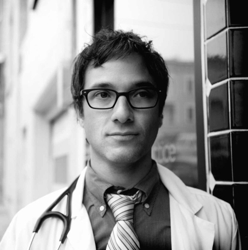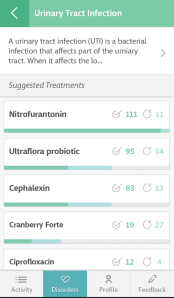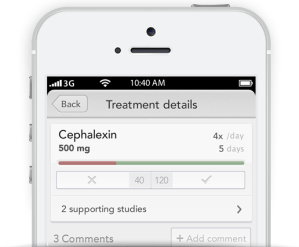During their work with patients, doctors will frequently contact colleagues with questions, trade horror stories, or converse about treatment methods. There isn’t really a technological solution to streamline this daily back and forth, but that’s what Share Practice aims to bring.
Founders Dr. Andrew Brandeis, Zach Bell and Benoit Carrier built an easy-to-use mobile app to serve as a sort of Wikipedia-meets-social-networks. Share Practice, just announced at TechCrunch Disrupt NY 2013, allows doctors to ask questions and receive feedback quickly from other verified doctors in their field rather than having to take out their phone to just call, text or email someone one at a time.
The San Francisco-based company raised $750K, and I spoke with Dr. Andrew Brandeis about why he built it and what the opportunity to disrupt the industry was. There is a lot of good that an app like this can do, but I had some questions around the privacy and security aspects of a service like this, to which Dr. Brandeis shared his thoughts:
 TC: Can you tell us a bit about your verification process for bringing Doctors onto the app? Of course, you’d want the best weighing in on these very important issues.
TC: Can you tell us a bit about your verification process for bringing Doctors onto the app? Of course, you’d want the best weighing in on these very important issues.
Dr. Brandeis: We’re using Doximity.com to verify doctors.
TC: Do you have any concerns about the potential of bad information being passed around? This is an issue for any social service, as we saw with the AP’s Twitter hacks, but this could be life or death.
Dr. Brandeis: Doctors are not anonymous on Share Practice. they will have a reputation. If they promote good stuff, they have a better reputation. The opposite is true, as well.
TC: Do you have any plans to get this in the hands of medical students or perhaps create a version just for them? Perhaps they can read information only and not share until they are finished with school.
Dr. Brandeis: Medical students are important as they are thirsty for this tool. Yes, we plan to give them access to consume the data, but not contribute it. Residents, however, are our most valuable demographic. They are doctors, learning and sharing rapidly. We’re working with groups to figure out the best way to include them.
TC: Can you share an experience where this app, while testing it, has actually saved you hours of research, or did something that you didn’t think about when first creating it?
 Dr. Brandeis: Absolutely. I have a patient with recurrent UTIs; none of our treatments worked. I went to Share Practice and learned about Fosfomycin, a powdered antibiotic rarely used. I Rx’d it to my patient, and it worked perfectly. She’s happy, I’m happy, and I upvoted it on Share Practice. Then a friend of mine learned about it for a similar patient situation and emailed me to thank me. Worked like a charm.
Dr. Brandeis: Absolutely. I have a patient with recurrent UTIs; none of our treatments worked. I went to Share Practice and learned about Fosfomycin, a powdered antibiotic rarely used. I Rx’d it to my patient, and it worked perfectly. She’s happy, I’m happy, and I upvoted it on Share Practice. Then a friend of mine learned about it for a similar patient situation and emailed me to thank me. Worked like a charm.
TC: Will there be a version for patients to see how their doctors fare in interacting with the community? Meaning, could a doctor participating in Share Practice become a badge of honor?
Dr. Brandeis: We may eventually open it up to patients to consume the data, only if it won’t dissuade doctors from producing it as they are. That’s our priority. We’re a doctor-focused app, not another consumer one. For now.
TC: Talk about the business model. Will doctors pay for this?
 Dr. Brandeis: It will be free for doctors. We monetize by learning what doctors think, why they think it, and what they are saying to each other. For example, every Walgreens knows that Dr. A Rx’d Lipitor for high cholesterol, but they don’t know why he chose that over another choice. We do. That info is valuable to drug companies, but it’s also valuable to insurance who can make coverage better if they know one treatment is more effective than another. That is especially important in the world of professional supplements, where we have a hard time making heads or tails of popular therapies.
Dr. Brandeis: It will be free for doctors. We monetize by learning what doctors think, why they think it, and what they are saying to each other. For example, every Walgreens knows that Dr. A Rx’d Lipitor for high cholesterol, but they don’t know why he chose that over another choice. We do. That info is valuable to drug companies, but it’s also valuable to insurance who can make coverage better if they know one treatment is more effective than another. That is especially important in the world of professional supplements, where we have a hard time making heads or tails of popular therapies.
TC: Will this data be turned into market research reports or become available for scientists who are looking for the latest diseases and health issues to focus on?
Dr. Brandeis: Absolutely. If we can spot trends and see what is working where and why, why not use that to direct research dollars. There are all kinds of off-label uses for drugs, herbs and supplements that will get proper research dollars when we learn that 10,000 doctors are using them in the same way for the same thing. Imagine that world.
The alpha version of Share Practice is in the hands of 200 users, with the team tweaking the app along the way. Dr. Brandeis tells me that the company is about six weeks away from a formal launch, but once it’s available, it’ll be filled with information about as many illnesses and their diagnoses as possible.
While at first blush this seems like a “Facebook for Doctors,” there are bigger opportunities with Share Practice. When you bring together smart and talented people and have them interacting in real time, the data collected along the way could make an actual impact in the world. Imagine if you’re suffering from a new strain of the flu with the same symptoms seen in most patients — if your doctor hasn’t encountered someone with the strain yet, they might not know how to treat it. This app could change that almost overnight.
During today’s demo at Disrupt NYC 2013, Brandeis showed the app off and fielded some very interesting questions from the judges. It seemed like they were pleased with what they saw:
Sure, Share Practice will require a lot of trust from the participating doctors, as well as actual usage, but if anyone knows what doctors truly need during their on-shift hours, it’s another doctor.
